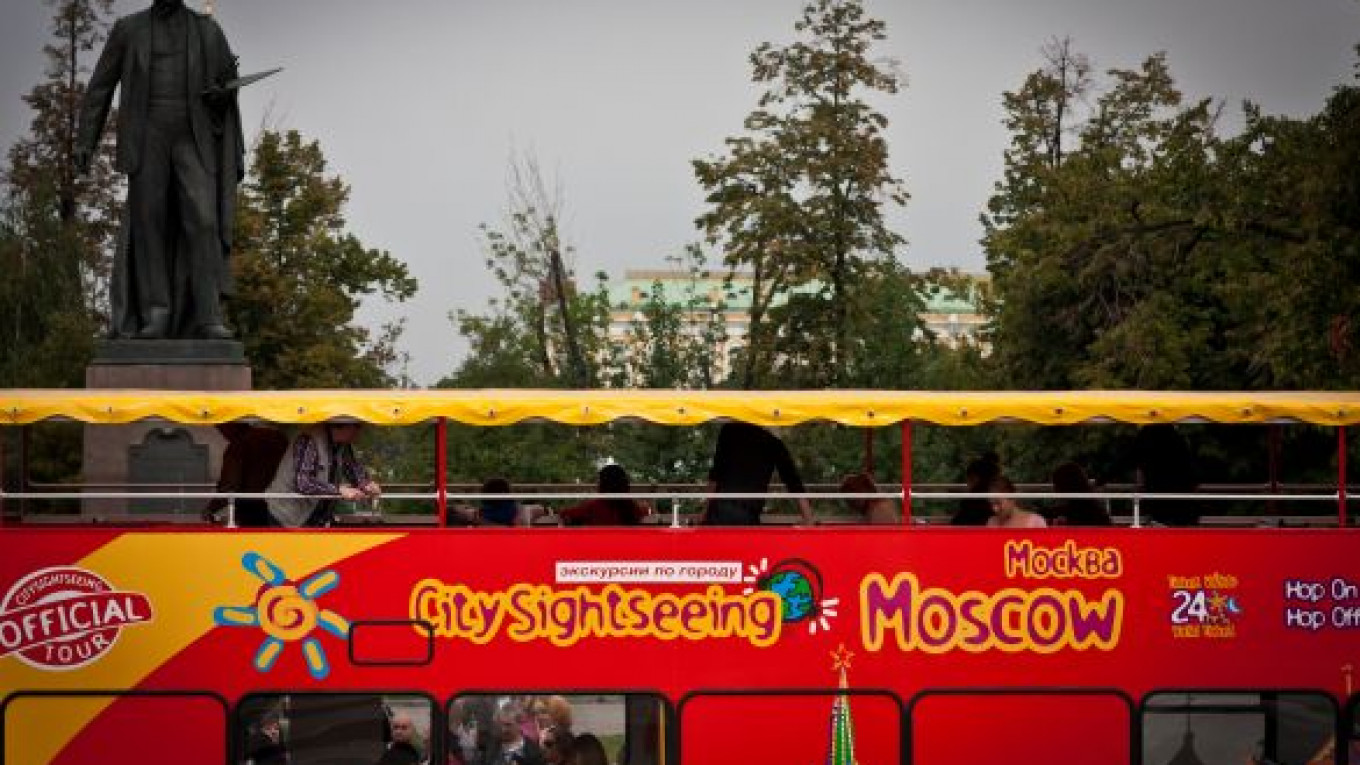Three red double-decker buses hit the streets around the Kremlin on Saturday, navigating potholes and curious traffic police, as Moscow became the last European capital to introduce the tourist vehicles that are a familiar sight for holidaymakers across the world.
Spain’s City Sightseeing invested between 2 million and 2.5 million euros ($2.5 million — $3.1 million) to start the service in 2012 in Russia, President Enrique Ybarra said.
But the launch has been a long time coming. Negotiations dragged on for four years, and red tape created problems up until the last moment.
The three buses unveiled at a demonstration tour for guests and reporters cost about 150,000 euros each, according to City Sightseeing. After a period doing tours in Stockholm and Copenhagen, they were refitted in Germany before being shipped to Russia early this year.
During a test period that will last until New Year’s, they will run on a 9-kilometer circuit taking in St. Basil’s Cathedral, Bolotnaya Ploshchad, Christ the Savior Cathedral, the Bolshoi Theater and Lubyanskaya Ploshchad.
Passengers can hop on and off the buses, which currently offer commentary in English and Russian, as many times as they like. Adult tickets cost 600 rubles per day. The 18 stops along the route will be marked with special signs, but they have not yet been installed. The buses began picking up paying tourists Saturday afternoon.
Executives and officials were dismissive of concerns that Moscow’s notorious traffic might create problems.
“It’s no different from Edinburgh, New York or Los Angeles,” said Iain Coupar, Head of Franchise at City Sightseeing. “These big cities experience traffic issues but they still manage to support an open-top tourist service.”
Seville-based City Sightseeing first launched its bus tours in London in 1999. It is now present in almost 100 cities on six continents.
The move to Moscow was in line with the company’s strategy of expansion into the Middle East and Asia, said Ybarra, adding that St. Petersburg, Sochi and Minsk are destinations likely to be included soon.
But coming to Russia has not been easy. Four years of discussions between City Sightseeing and Moscow officials even required the personal intervention of Mayor Sergei Sobyanin in 2011 to keep the project moving forward, said Sergei Spilko, the chairman of Moscow’s Tourism Committee.
“There were a lot of problems in Moscow,” said City Sightseeing Russia president Sergei Lavrentiev. “Those agencies that had to give their agreement did not understand that their agreement was necessary.”
The launch date was originally set for June 15, but was pushed back because of last minute delays, including customs issues for the buses at the Russian border.
And possible stumbling blocks for the future were clear Saturday as the buses carrying guests liberally plied with Scottish whiskey navigated road repairs and were stopped by traffic police.
There are plans to add two more double-decker buses to the Moscow fleet this year to service a total of three routes, all within the Garden Ring. The buses are open-topped, but in the winter they will be fitted with double-glazed windows and a proper roof.
Related articles:
A Message from The Moscow Times:
Dear readers,
We are facing unprecedented challenges. Russia's Prosecutor General's Office has designated The Moscow Times as an "undesirable" organization, criminalizing our work and putting our staff at risk of prosecution. This follows our earlier unjust labeling as a "foreign agent."
These actions are direct attempts to silence independent journalism in Russia. The authorities claim our work "discredits the decisions of the Russian leadership." We see things differently: we strive to provide accurate, unbiased reporting on Russia.
We, the journalists of The Moscow Times, refuse to be silenced. But to continue our work, we need your help.
Your support, no matter how small, makes a world of difference. If you can, please support us monthly starting from just $2. It's quick to set up, and every contribution makes a significant impact.
By supporting The Moscow Times, you're defending open, independent journalism in the face of repression. Thank you for standing with us.
Remind me later.


